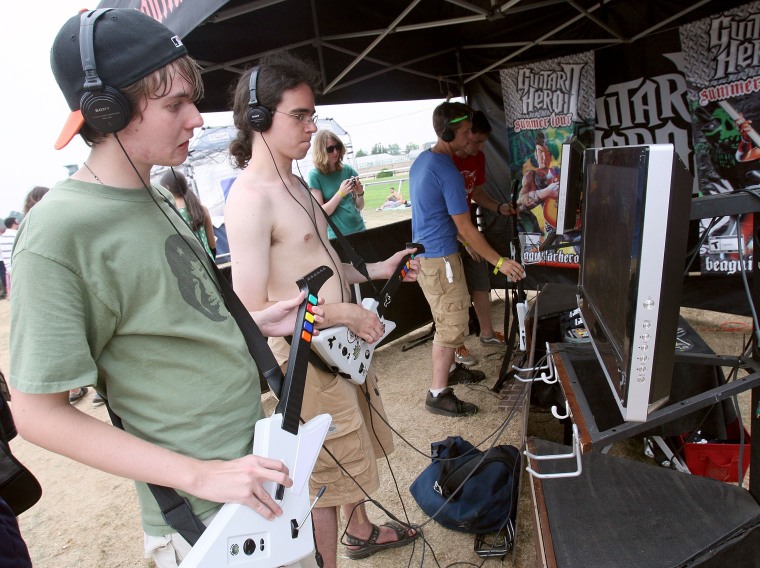It’s unusual for a kindergartner to beg his father to download Accept’s 1984 hit, “Balls to the Wall” to an iPod Nano, but not for Gary Wedbush of Manhattan Beach, Calif.
His sons, ages 6 and 9, play 10 hours of “Guitar Hero” a week, and are so obsessed with the game that they’ll wake up early, make breakfast, and get ready for school — all on their own — just so they can squeeze a few more minutes of play into their day.
The curious side effect is both kids are now fans of classic rock and, less thrilling for Wedbush, heavy metal.
It’s not an isolated case. “Guitar Hero” and “Rock Band” are exposing kids to music that they otherwise wouldn’t pay attention to on the airwaves.
“It’s a big part of our secret agenda,” says Harmonix co-founder Alex Rigopulos, whose company created both franchises. The games “are about connecting people with music in a deeper way.”
They’re also about reaching a massive audience. “Rock Band” sold 1.5 million units in two months, according to the most recent numbers by The NPD Group market research firm.
Fans of the game have already downloaded 5 million songs. And the “Guitar Hero” franchise has sold 14 million units in North America since its launch in 2005.
After rocking through “Guitar Hero II,” “III” and “Encore: Rocks the 80s,” Wedbush’s kids compiled iPod playlists containing 50 to 60 classic rock songs by the likes of Lynyrd Skynyrd, Megadeth and The Vapors.
“My kids spend most of their day driving around with their mom listening to KROQ,” a Los Angeles-area radio station that plays mainstream tunes by the likes of Modest Mouse and The Strokes, says Wedbush.
The credit for that? “It really was Guitar Hero,” he says.
Young fans of Aerosmith and The Outlaws
“Rock Band” has had similar effects on Julie Volchenboum’s four children. Her 11-year-old son plays the game for about five hours a week — and would play more if his screen time wasn’t limited, she says.
He has the game’s entire set list, which includes 30-year-old tunes like The Outlaws’ “Green Grass & High Tides,” Aerosmith’s “Train Kept A Rolling” and Deep Purple’s “Highway Star,” and often instigates family-wide dance parties in the kitchen.
His habit also has his parents rummaging through their music collection to find forgotten, full-length albums by Boston or The Who. “Rock Band” has even inspired Volchenboum’s son to learn Journey’s “Don’t Stop Believing” on the piano.
“He’s a music connoisseur now,” says Volchenboum, 37. “He can more reliably name a rock song than I can.”
The result is intentional, says Paul Degooyer, senior vice president of DVD, gaming, and audio at MTV, which distributed “Rock Band.” Advisors carefully assembled the game — just like an album — to propel players through a broad collection of music.
The game “is driving people who might not be into classic rock into it. That’s exactly what we were trying to do,” he says.
Older artists see the appeal
Beyond influencing young musical tastes, the games have had an impact on classic recording artists.
According to Neilson SoundScan, which tracks both digital and retail music, sales of Aerosmith’s single, “Same Old Song and Dance,” increased 136 percent the week after “Guitar Hero III” was released, and skyrocketed 400 percent the week after Christmas.
The success prompted Aerosmith to help create “Guitar Hero: Aerosmith,” a musical tour of the band’s history and influences, that is scheduled for release in June.
This is in stark contrast to the original, cover song-filled “Guitar Hero.” Its sequel secured the original recordings for only a third of the tracks. Now artists are seeking inclusion in the games.
“It's cool to see so many bands working closely with us,” says RedOctane co-founder Charles Huang, whose company published the "Guitar Hero" franchise.
Early on, artists “were disengaged and just licensing us music; now they want to be heavily involved. Bands and labels are seeing this as one of the newest ways to introduce music.”
The Sex Pistols wanted to be in “Guitar Hero III” so badly that the band reunited to re-record “Anarchy in the U.K.,” because it didn’t have the original master recordings.
Living Colour decided its guitar solo in “Cult of Personality” was too easy, so it, too, hit the studio. Both Guns N’ Roses’ Slash, and Rage Against the Machine’s Tom Morello, wrote a new song for the game.
But for fans of the old stuff, “Guitar Hero” and “Rock Band” have allowed for some intense, inter-generational jam sessions. Wedbush, who is a fan of classic rock, says his sons now have the same taste as 40-year-olds.
“It’s cool to see them getting into music,” he says. “Not to over-simplify, but any time you find common interests with your kids it’s a very cool thing. You get to connect in a way that’s different than the normal parent-child relationship.”
His boys usually quietly strum away on their plastic guitars. “Every time I go by,” recounts Wedbush, “I have to say, ‘If you’re going to play this game, play it loud.’ ”
